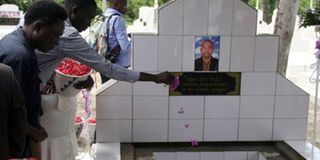Burundi chaos must be tamed before it spirals into genocide

People attend the funeral ceremony for Welly Nzitonda, the son of human rights defender Pierre-Claver Mbonimpa, on November 10, 2015 in Bujumbura, Burundi. Nzitonda was the second member of Mbonimpa's family to have been killed. The endless chaos culminated in a UN Security Council meeting on Thursday, November 12, 2015 to finding ways of saving Burundi from itself. PHOTO | LANDRY NSHIMIYE |
What you need to know:
But even before the Security Council session, the UN, EU and the African Union had agreed to convene a meeting either in Addis Ababa or Kampala between Burundi government and the opposition.
With the horrors of the 1994 Rwanda genocide still fresh in our minds, the Security Council session was precisely aimed at averting such a prospect in Burundi.
For a tiny, poverty stricken country with a history of violence, Burundi is a classic case of a nation whose leaders seem unable or unwilling to get their act together.
Not surprisingly, in recent times the country has been on the verge of bankruptcy, mainly because of the isolation it has found itself in.
In the meantime, the endless chaos culminated in a UN Security Council meeting on Thursday to finding ways of saving Burundi from itself.
Eventually, the council adopted the French-drafted resolution that condemned the killings, torture, arrests and other violations.
But even before the Security Council session, the UN, EU and the African Union had agreed to convene a meeting either in Addis Ababa or Kampala between Burundi government and the opposition.
A veritable powder keg by any standards, Burundi has been rudderless and wracked by chaos ever since President Pierre Nkurunziza declared he was running for a third term, launching his bid to prolong his rule in April.
BRUTAL CRACKDOWN
Since then, protests have been met with a brutal crackdown on opponents, activists and journalists.
Sadly, the violence has resulted in at least 240 deaths and more than 200,000 fleeing the country.
Unfortunately, the chaos is too reminiscent of the civil war that raged from 1993 to 2006 and left 300,000 dead.
Even more chilling, there has been talk of a possible genocide.
With the horrors of the 1994 Rwanda genocide still fresh in our minds, the Security Council session was precisely aimed at averting such a prospect in Burundi.
EU-AFRICA MEETING
Talking about refugees and migrants, a major summit in Malta on Wednesday saw African leaders meeting their EU counterparts.
The rare gathering of around 50 leaders was held in a bid to tackle the migration crisis that has rocked Europe.
The influx of migrants and refugees has seen countries like Slovenia barricading their borders to keep out the refugees.
The Balkan state’s army began rolling out razor wire along the border with Croatia.
It was following in the footsteps of Hungary, which sealed its borders last month.
Exacerbated by the crisis in Syria, the crisis also involves African migrants trying to flee crises like the Burundian one.
Not surprisingly, the Malta summit saw EU leaders offering their African counterparts up to $3.8 billion to keep their citizens at home and to take back those trying to enter Europe.
A meeting in The Hague next week will focus, among other things, on issues relating to African crises and their resolution, with special focus on the role of the International Criminal Court.





